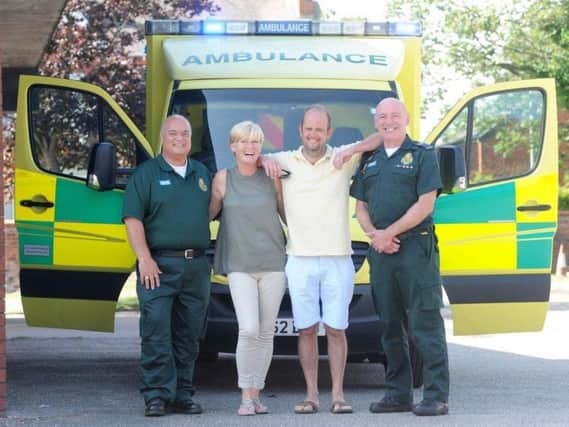Project to map location of every life-saving device on Fylde coast


Progress towards a new national database listing the locations of the devices could make “the difference between life and death”, according to man whose wife used one to save him after his heart stopped.
Robert Marsden, 43, from Freckleton collapsed at his home on June 6 after one of his arteries became blocked.
Advertisement
Hide AdAdvertisement
Hide AdHis life was saved when his wife Rachel, 50, used a defibrillator which was situated at the end of the street, while their neighbour Geoff Hamriding, a Blackpool based paramedic, carried out CPR.
Robert said: “Without the defibrillator I don’t think I would be here today.
“We are lucky there are four in the village but it is very important that people know where they are.
“A few people in the village have said they know where one of them is but not the others.
Advertisement
Hide AdAdvertisement
Hide Ad“Knowing where they are located could be the difference between life and death.
“The database is excellent news.”
The partnership by the NHS, the British Heart Foundation (BHF) and Microsoft aims to map the life-saving devices so they can be made readily available for every out-of-hospital cardiac arrest in the UK.
Defibrillators are small machines that can ‘shock’ a person’s heart into restarting after a cardiac arrest. If this can be done in the first few minutes, patients have a 60-70 per cent chance of making a full recovery.
The North West Ambulance Service (NWAS), which has welcomed the move, already holds a list of defibrillators but estimates there are thousands that remain unknown and hidden in places likes businesses, shopping centres, social clubs and schools.
Advertisement
Hide AdAdvertisement
Hide AdRachel said it was fortunate there was a defibrillator nearby when her husband collapsed.
She said: “I got the code off the ambulance service to release it and while Geoff continued with CPR, I used the defibrillator four times.”
Geoff added: “I carried out CPR for more than 20 minutes and we shocked him four times with the AED (automated external defibrillator).”
Speaking at the time Mark Lewis, NWAS operations manager for the Fylde stations said: “Having these AED’s out in the community, so we can get the shock in as early as possible, is brilliant and they have been shown to save lives.
Advertisement
Hide AdAdvertisement
Hide Ad“The more of them we can get out there the better and it comes down to people fund raising for them to be put out.”
The BHF states that public access defibrillators are used in less than three per cent of out-of-hospital cardiac arrests, significantly reducing the survival chances of tens of thousands of people every year.
There are over 30,000 out-of-hospital cardiac arrests every year in the UK, but less than one in 10 people survive.
In countries where the public are better equipped to recognise and deal with cardiac arrests, survival rates are up to three times higher.
Advertisement
Hide AdAdvertisement
Hide AdCommunity engagement manager at NWAS, Andrew Redgrave said: “The use of CPR and public defibrillators can mean the difference between life and death for a patient in cardiac arrest.
“Defibrillators allow everyday members of the public to become lifesavers by providing the all-important shock before our ambulance crews arrive. Even just two or three minutes earlier can make a huge difference.
“We know that many people raise funds in their local area to have defibrillators installed but they often forget to tell us they’ve done so.
“This means that we could get a call for a suspected cardiac arrest where this potentially life-saving piece of kit is available and we can’t tell the caller to go and get it.
Advertisement
Hide AdAdvertisement
Hide Ad“The more defibrillators we know about, the more lives will be saved. It’s that simple.”
lThe national defibrillator database will launch in spring 2019, but defibrillator guardians in Cheshire, Merseyside, Greater Manchester, Lancashire and Cumbria can register their lifesaving devices with North West Ambulance Service now at www.nwas.nhs.uk.